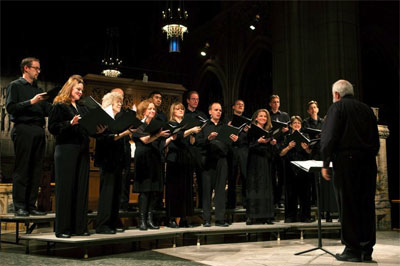by Nicholas Jones

For at least six hundred years, Christmas has been the occasion for composers to write for choirs. Last weekend, Ross Duffin and Quire Cleveland brought us a rich program of mostly unfamiliar treasures. I attended Sunday afternoon’s concert, for which Trinity Cathedral’s seats were mostly full, and during which the sun streamed through the stained-glass windows.
Quire, now in its fifth year, is an ensemble of twenty highly accomplished singers. Their sound was crystal clear, with crisp diction and uniform vowels. They sang with remarkable ease in five languages—Latin, German, French, Spanish, and English—sometimes at breakneck speed, as in Michael Praetorius’s delightful German/Latin “patter song,” Psallite, unigenito.
The varied program included mostly late-medieval and Renaissance works, largely on the lighter side. Duffin’s selection featured a good proportion of carols and motets that gave vocal homage to the babe in the manger. Among my favorites was a stunning piece, Quis petis, o fili? by the Tudor composer Richard Pygott, from a manuscript copied out for Henry VIII. Its sensual text, in English and Latin, was a love feast between Mary, her son, and his father, with kisses enough for Catullus.
A group of French songs brought the exuberance of secular music to the Nativity scene. A mid-sixteenth-century piece by Mathiew Sohier took a bawdy song off the streets (about a young girl married against her will) and made a charming “noël” of it. In Quire’s engaging rhythms, we could practically hear the shepherds dancing, as the text says, after their visit to the baby Jesus.
At the start of the concert, Duffin announced that, in the shadow of the Newtown shootings, the first two pieces on the program would be replaced by a motet about the biblical massacre of the innocents, Jacobean composer George Kirbye’s intense Vox in Rama: “Rachel weeping for her children, refusing to be comforted, because they are no more.”
Quire’s ensemble singing stood out for its extraordinary accuracy of pitch and its ringing tones. Not surprising for a group directed by the author of a book decrying equal temperament (the “compromise” tuning used on today’s pianos), Quire sang with amazingly pure and lovely intervals. The open fifths and octaves of medieval and Renaissance harmony were secure from the very beginning of the chords.
Many Nativity carols are based on intricate “macaronic” texts (that is, in a mix of several languages; “macaroni” was originally a term for a mishmash of different kinds of food, and by extension, of bits of poetry!) Quire pulled these off with stunning panache. The whole ensemble usually sang the refrain (as in the familiar fifteenth-century English “Nowell sing we, both all and some; / Now rex pacificus is ycome!”). The verses were then distributed amongst small ensembles of two or three singers, each verse taken by different singers. It was a joy to hear the variety of textures and tones that resulted from this distribution of vocal riches.
Quire’s experienced and focused singers handled the complicated roadmap of these strophic songs without hesitation, unerringly steering down the correct lane without losing a beat. The varying makeup of these ensembles sometimes landed the soloists at opposite ends of the choral line-up, some distance from each other. And yet, the intricate rhythms were kept in sync, almost without exception.
Much of the appeal of this Christmas feast was due to the commitment and skill of its head chef, CWRU professor Ross Duffin. He has clearly spent a great deal of effort unearthing these wonderful pieces. He edited most of the songs, and in many cases added period-appropriate harmonizations to the bare-bones outlines that come down to us in the old manuscripts. He conducted skillfully and effectively, energetically setting the mostly upbeat tempos and expressively embodying the cross-rhythms and counterpoint.
Quire was selling, at very reasonable prices, two CDs based on previous Christmas concerts—well worth buying from their website, www.quirecleveland.org. A CD of Jacobean motets is also in the making for release in 2013.
Nicholas Jones is Professor of English at Oberlin College and a keen amateur musician.
Published on ClevelandClassical.com December 26, 2012
Click here for a printable version of this article.


